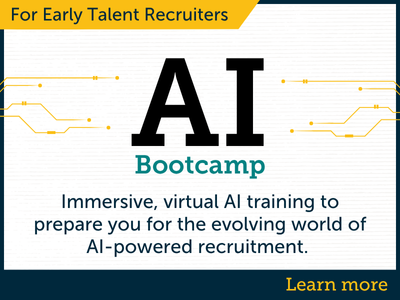Curriculum Helps Career Services Staff Engage, Support Students With Autism
September 10, 2021 | By Kevin Gray
INDIVIDUALS WITH DISABILITIES

TAGS: best practices, career development, diversity and inclusion, nace insights, students with disabilities,
Spotlight for Career Services Professionals
The College Autism Network (CAN) helped create the Autism Career Empowerment (ACE) curriculum after hearing concerns from college autism support program professionals that their career services colleagues were not always conversant in autism and sometimes did not understand how best to support autistic students.
“We also heard from employers that they wanted to recruit more neurodivergent students, but didn’t feel those students were often involved in typical recruitment efforts, like job fairs and summer internships,” explains Lee Burdette Williams, CAN’s executive director.
CAN partnered with the Frist Center for Autism and Innovation at Vanderbilt University and the TRIAD team of the Vanderbilt Kennedy Center. CAN provided most of the content and the Frist Center team created the ACE curriculum using their platform and resources.
The ACE curriculum is free and comes without any obligation. Career services practitioners can register for the curriculum; registration also includes access to the Workforce Readiness and Preparation (WRaP) program, a pre-employment workforce preparation program that uses STEM tools to encourage innovation, leadership skills, and development of an entrepreneurial mindset.
ACE is a modular curriculum with a total of 13 individual lessons, or modules, that fit into three categories:
- Foundational information, which helps users understand autism and neurodiversity in fairly general terms;
- Social skills and soft skills, which are often a challenge for autistic people and that put them at a disadvantage in the job-search process as well as in some employment settings; and
- Job readiness, which is familiar to career services professionals, but is addressed through the lens of supporting neurodivergent students in resume development, interview training, and portfolio development.
The modules are short, interactive, and interesting, because the curriculum development team recognized that career services practitioners often find it difficult to find time for professional development.
“[The primary goal of the ACE curriculum is] to provide career services professionals with basic information about the common characteristics of autism and other learning differences so they can better tailor their support of students seeking assistance in their internship and job searches,” Williams says.
“Beyond that, [its aim is] to bring to campus a better overall sense of how to best support autistic students, to create an ‘autism-friendly’ campus where autistic students can rely on all professionals, not just disability services or autism support professionals, to help them succeed.”
Support is critical as, Williams adds, “Autistic people can be successful in college and in work settings if they have the support of others who understand that the social and communication challenges they sometimes present are not always choices they make, but the result of hardwired differences in their brains.
“Just like a person is left-handed or right-handed based on their brain’s hardwiring, an autistic person may have difficulty reading social cues or be very sensitive to certain sensory stimulation because of how their brain is wired. Once others understand this and recognize what they are seeing, they can move past those issues and appreciate the talents and intelligence of the autistic person they are working with.”
There are pitfalls for career services professionals to avoid. For example, Williams says that autistic students often “do not fit the traditional model for career development” and may not wish to participate in typical activities like job fairs, which can be overstimulating and may lead a career counselor to think the students are just being stubborn or are uninterested in succeeding.
“That’s usually not the case,” she explains. “It’s more that things that might seem like ‘common sense’ to neurotypical people are not ‘common’ to autistic people.”
Career services professionals can use what they learned from the ACE curriculum to help them connect with and assist students with autism. Ideally, career services professionals who use the ACE curriculum become more skilled at recognizing neurodivergent students; not just those who have an autism diagnosis. Williams points out that there are many people who are just “different” in the ways they perceive the world and interact with others.
“Professionals who complete this curriculum will have a better understanding of how to assist and counsel students who are eager to get internships and jobs, but don’t ‘fit the mold’ of the neurotypical student,” she continues.
In addition to going through the ACE curriculum, Williams advises that career services professionals looking to better connect and work with students with autism:
- Talk about neurodiversity the same way they talk about other types of diversity.
- Partner with people on campus who work with neurodivergent students. Disability services is the most likely place to find them.
- Research and familiarize themselves with neurodiversity hiring initiatives. If they routinely work with major recruiters, ask if the firm has an initiative. Often, the people who run these initiatives and the campus recruiters do not talk to one another very much. Learn about the many organizations that specialize in placing neurodivergent candidates in jobs. Start with groups like Ultranauts, Integrate Autism Employment Advisors, Neurodiversity in the Workplace, and SourceAbled. They are familiar with employers that are seeking these candidates and can provide additional preparation and support that may be beyond the campus professional’s ability or capacity.
- Hire neurodivergent students and neurodivergent professionals to work in the career services office.
Adds Williams: “More and more employers are creating neurodiversity hiring initiatives, and want to partner with career services offices to identify and prepare students to become candidates for their jobs. If career services staff want to get their neurodiverse students noticed by these initiatives, they have to be able to support them first.”
Spotlight for Career Services Professionals
The College Autism Network (CAN) helped create the Autism Career Empowerment (ACE) curriculum after hearing concerns from college autism support program professionals that their career services colleagues were not always conversant in autism and sometimes did not understand how best to support autistic students.
“We also heard from employers that they wanted to recruit more neurodivergent students, but didn’t feel those students were often involved in typical recruitment efforts, like job fairs and summer internships,” explains Lee Burdette Williams, CAN’s executive director.
CAN partnered with the Frist Center for Autism and Innovation at Vanderbilt University and the TRIAD team of the Vanderbilt Kennedy Center. CAN provided most of the content and the Frist Center team created the ACE curriculum using their platform and resources.
The ACE curriculum is free and comes without any obligation. Career services practitioners can register for the curriculum; registration also includes access to the Workforce Readiness and Preparation (WRaP) program, a pre-employment workforce preparation program that uses STEM tools to encourage innovation, leadership skills, and development of an entrepreneurial mindset.
ACE is a modular curriculum with a total of 13 individual lessons, or modules, that fit into three categories:
- Foundational information, which helps users understand autism and neurodiversity in fairly general terms;
- Social skills and soft skills, which are often a challenge for autistic people and that put them at a disadvantage in the job-search process as well as in some employment settings; and
- Job readiness, which is familiar to career services professionals, but is addressed through the lens of supporting neurodivergent students in resume development, interview training, and portfolio development.
The modules are short, interactive, and interesting, because the curriculum development team recognized that career services practitioners often find it difficult to find time for professional development.
“[The primary goal of the ACE curriculum is] to provide career services professionals with basic information about the common characteristics of autism and other learning differences so they can better tailor their support of students seeking assistance in their internship and job searches,” Williams says.
“Beyond that, [its aim is] to bring to campus a better overall sense of how to best support autistic students, to create an ‘autism-friendly’ campus where autistic students can rely on all professionals, not just disability services or autism support professionals, to help them succeed.”
Support is critical as, Williams adds, “Autistic people can be successful in college and in work settings if they have the support of others who understand that the social and communication challenges they sometimes present are not always choices they make, but the result of hardwired differences in their brains.
“Just like a person is left-handed or right-handed based on their brain’s hardwiring, an autistic person may have difficulty reading social cues or be very sensitive to certain sensory stimulation because of how their brain is wired. Once others understand this and recognize what they are seeing, they can move past those issues and appreciate the talents and intelligence of the autistic person they are working with.”
There are pitfalls for career services professionals to avoid. For example, Williams says that autistic students often “do not fit the traditional model for career development” and may not wish to participate in typical activities like job fairs, which can be overstimulating and may lead a career counselor to think the students are just being stubborn or are uninterested in succeeding.
“That’s usually not the case,” she explains. “It’s more that things that might seem like ‘common sense’ to neurotypical people are not ‘common’ to autistic people.”
Career services professionals can use what they learned from the ACE curriculum to help them connect with and assist students with autism. Ideally, career services professionals who use the ACE curriculum become more skilled at recognizing neurodivergent students; not just those who have an autism diagnosis. Williams points out that there are many people who are just “different” in the ways they perceive the world and interact with others.
“Professionals who complete this curriculum will have a better understanding of how to assist and counsel students who are eager to get internships and jobs, but don’t ‘fit the mold’ of the neurotypical student,” she continues.
In addition to going through the ACE curriculum, Williams advises that career services professionals looking to better connect and work with students with autism:
- Talk about neurodiversity the same way they talk about other types of diversity.
- Partner with people on campus who work with neurodivergent students. Disability services is the most likely place to find them.
- Research and familiarize themselves with neurodiversity hiring initiatives. If they routinely work with major recruiters, ask if the firm has an initiative. Often, the people who run these initiatives and the campus recruiters do not talk to one another very much. Learn about the many organizations that specialize in placing neurodivergent candidates in jobs. Start with groups like Ultranauts, Integrate Autism Employment Advisors, Neurodiversity in the Workplace, and SourceAbled. They are familiar with employers that are seeking these candidates and can provide additional preparation and support that may be beyond the campus professional’s ability or capacity.
- Hire neurodivergent students and neurodivergent professionals to work in the career services office.
Adds Williams: “More and more employers are creating neurodiversity hiring initiatives, and want to partner with career services offices to identify and prepare students to become candidates for their jobs. If career services staff want to get their neurodiverse students noticed by these initiatives, they have to be able to support them first.”
",
"url" : "https://www.naceweb.org/diversity-equity-and-inclusion/individuals-with-disabilities/curriculum-helps-career-services-staff-engage-support-students-with-autism/"
}





